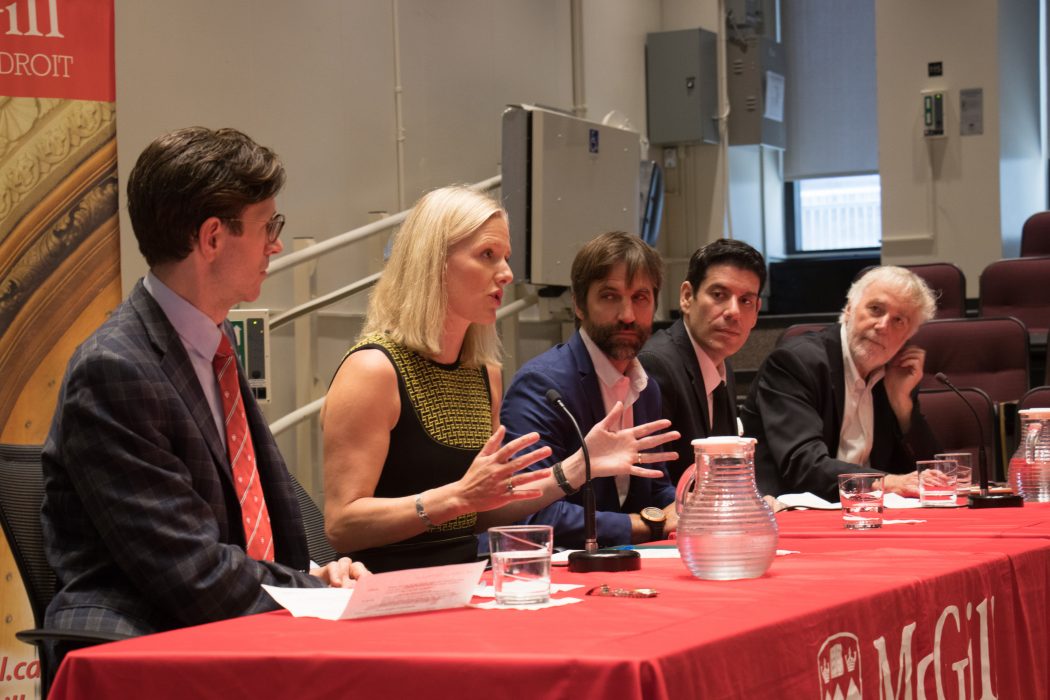On September 15, Catherine McKenna, Minister of Environment and Climate Change, returned to her alma mater to participate in a panel discussion on sustainability and climate action as part of her Climate Campus university tour. The McGill University Faculty of Law was her first stop.
McKenna was joined by four other panelists: Robert Leckey, Dean of the McGill University Faculty of Law, Steven Guilbeault, Cofounder and Senior Editor of Equiterre, Professor Tim Moore, Director of the Trottier Institute for Science and Public Policy, and Jose Mauricio Ganona, a McGill University Faculty of Law doctoral student. McKenna began the panel discussion by providing students and members of the faculty with insight into the very beginnings of her political career. After co-founding and serving as the Executive Director of Canadian Lawyers Abroad and serving as a United Nations legal advisor in East Timor, McKenna decided to pursue electoral politics. Unsatisfied with the political status quo, McKenna explained that she “just stepped up and ran” for office, with a mission of making a difference. McKenna used this as a springboard into her next point: taking action.
McKenna is embarking on her College Climate tour in order to encourage young people to take action against climate change and to channel the ideas of university students, which she said repeatedly were plentiful and well-thought out, into action. Stating that “[students] know that we have no choice but to act,” the Minister praised the innovative science, policy, and action coming out of universities across the country.
McKenna’s message is part of a larger narrative on the inseparability of the environment and the economy. Environmental protection is integral to maintaining a strong, successful economy. Doctoral candidate Jose Mauricio Ganona emphasized this point with a sense of urgency: “the supposed choice between saving the planet or saving the economy is not even applicable.” McKenna encouraged those in attendance to put a price on pollution in order to curb its impacts, citing CarbonCure Technologies, founded by McGill alum Rob Niven, which allows cement manufacturing plants to recycle carbon dioxide waste in order to create more environmentally friendly building materials. In addition to CarbonCure and related industries, there has been a significant move away from coal, according to Guilbeault, cofounder and editor of Equiterre. The panelists agreed that this is a hopeful trend.
Members of the panel also discussed the theme of partnership and dialogue. In response to a question posed by a first year law student on the subject of current disagreements between the Trump and Trudeau Administrations on the topic of sustainability and environmental protection, McKenna stressed that diplomacy is important: “it’s easy to yell and scream but that’s not the right approach…you just have to be smart about things.” In the same vein, McKenna encouraged students and faculty to bring sustainability dialogues to their communities and simply engage people in thoughtful discussions about climate change. McKenna emphasized the importance of bringing women and indigenous people into the conversation and looking at the gendered impact of climate change, an area of study that is often overlooked.
After fielding questions on a variety of topics, including microplastics, pipelines, and oil refineries, McKenna imparted some final remarks. She implored those in attendance to take action and educate people who do not believe in climate change and engage in meaningful conversation. She also harked back to a conversation with astronaut Chris Hadfield. Hadfield and the Minister discussed how “you can go around our planet in something like ninety minutes…[we] always think our planet is so big,” but “[it’s]actually really little and we’ve only got one.” McKenna encouraged the audience to be aware of the weight and impact of their actions on our delicate ecosystem, and urged students in attendance to continue their research in the aim of producing “hard, credible science” that the Liberal government can translate into climate policy.








